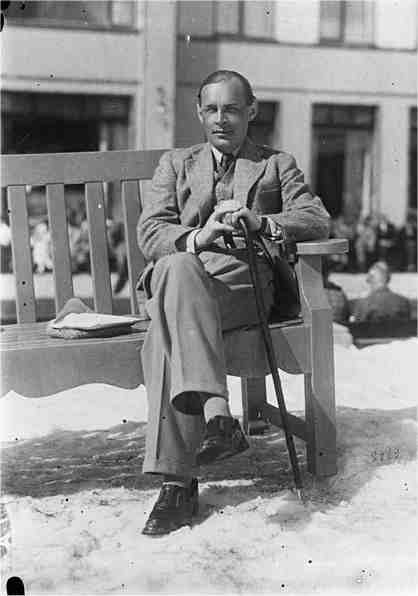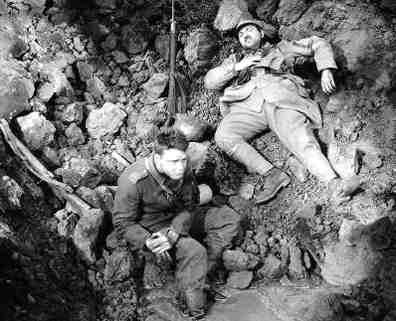

Two great books treating mortal combat, Homer's Iliad and Erich Maria Remarque's All Quiet on the Western Front, do not flinch from the horror of war, but they could not be more different in concept. Both give us a close up view in appalling detail of the brutality of war, but Homer, while not neglecting the gore, depicts war as an honorable contest between warrior elites and the gods who support them. Homer sees mortal combat as the proving ground of heroes. For Remarque, who writes of the common soldier, not the elite, war was the ultimate adventure of nation states gone mad, and the best way to communicate his message was to plunge the reader's hand into the bloody wound of war.1
Despite man's penchant for warfare, from the beginning of history (and well before, we assume), despite centuries of praying for peace and a century of secular movements dedicated to its achievement, no literary treatment of war as an unmitigated tragedy (rather than a glorious affirmation of man at his heroic best) had been written until Erich Maria Remarque gave us All Quiet on the Western Front. Kipling's jingoistic works focus on the glory of empire won through war; Tolstoy considers war's grand scope-we do not see the common soldier with his guts hanging out. Among 19th Century American writers, Steven Crane's Red Badge of Courage2 points the graphic way-one suspects Remarque was a close reader of Crane's treatment of our Civil War-but the novel does not have the immediacy, the direct emotional clout of Remarque's account derived from personal experience. American war novels written since Remarque's, novels like The Naked and the Dead, Catch 22, and From Here to Eternity, examine the sociology or humor or romance of men at arms. Vonnegut's Slaughterhouse-Five, profound as his treatment is, shifts the horror of war onto a metaphysical plane. Remarque takes us into the trenches to show us a eighteen-year-old conscript being decapitated by a mortar shell, watch as his limbs are blown off by a land mine or his body riddled with shrapnel from an aerial bomb. No one but Remarque (and Homer) makes us stand by as a conscript slices off the face of the enemy, both men still in their teens, with a sharpened trenching tool. This is war. The rest is melodrama.
Because Remarque showed war for what it is, not for what man makes of it through metaphor, All Quiet on the Western Front was immediately labeled an anti-war novel, while the Iliad, an equally gory treatment of war, transformed horror into glory through the exultation of the hero. The only heroism in Remarque's account is the ultimate sacrifice a soldier makes for his comrade, one maimed man dragging his now legless buddy from the front, and dying for it. What to make of war: it's all a matter of spin, or the lack of it.
All Quiet on the Western Front (Im Westens Nichts Neues, in the original German), Remarque's account of trench warfare in World War I, is a 300-page account of the physical, emotional and psychological brutality of war. By page 30, he has the reader in tears, by mid-book we are nauseated by closely observed and faithfully recorded graphic descriptions of butchery, then furious with the powers that be and their slaughter of millions of men, most still boys, or were until sent to the front.
By book's end we are resigned, as are the soldier protagonists, to a numb acceptance of mankind's most evil pursuit, power and the bloody means used to attain it.
The novel's style is simple:
Remarque says he wrote and rewrote the book until every sentence could be read without difficulty by the common man, the very men who in his novel are being marched to the slaughter. In truth, high writing would have been superfluous and offensive: the closely-observed data is so overpowering that no finesse with language is needed or desired. How many ways can you describe a young man just out of high school stumbling through bomb craters holding his intestines in his hands?
Narrative is not a strong point in the novel. The stories are brief and few depict warfare adventures. Most treat the small things of a soldier's life at the front, his hunt for food, for comfort, and one brief charming boyish search for sex with a trio of French girls just across the river demarcating the line between the two hostile forces. Their is no narrative line building to a climax and dénouement, no delayed expectations other than who's to live and who's to die, an outcome predetermined ten pages into the book: no one will live, all will die. The body of the book is given over to observation of the casualties of war and the effect the physical slaughter has on the psyches of the young men sent to do the work of the generals and the politicians that hire them.
The occasional leaves granted to the men are particularly poignant, showing the heartrending inability of these men, through the experience of Paul, the novel's narrator and major character, to connect with the home life they knew only a year or two previously. The horrors of war have inalterably changed them; they cannot comprehend nor be comprehended by the home town crowd. In their alienation, they are almost happy to be going back to their units to be with men who have experienced what they have. And they do go back, almost to a man, until the odds run out and they fall.
In the year following its release in 1929, All Quiet on the Western Front sold 1.2 million copies. And that was just the first year. The book has never been out of print and continues to be widely read today. It was accepted as the greatest anti-war book ever written when released and it retains that rank today. No work on war has come even close to the emotional power of Remarque's masterpiece. The book went on to be translated into at least fifty-eight languages-no one seems sure of the exact count-and the 1930 Lewis Milestone movie, a masterpiece in its own right, was so cinematically powerful that it was banned in Germany until 1958 (the ban was lifted but the Germans never gave Remarque back his citizenship cancelled by the Nazis). The ban held in France until 1962. 1962! France, land of Liberté, Egalité, Fraternité! Which makes Remarque's disdain for the major powers and his shared guilt thesis for the destruction of millions of men in his war-he was wounded several times in WWI-and by inference, the wars to come, thoroughly sympathetic. 3
In speaking of Erich Maria Remarque, it is difficult to say what is of more interest, his work, or his life after his novel of war in the trenches was released to international acclaim. This, however, is fairly certain: the novel made him rich and famous and without it he would not have had the life that he did. Remarque created his own persona. Beginning with his name. Erich Paul Remark was born in 1898 into a working class family in Onasbruck, Lower Saxony. The family was of French decent but had changed its name in response to 19th Century German xenophobia. Remarque changed it back to the French spelling and added the Maria in honor of his mother. But German he was and German was the language he wrote in. He never used any other.
After his discharge from the army he moved to Berlin, where he drove race cars for a tire company. There he met and married Jutta Jambona, a leading, and by all reports stunning, high fashion model, a marriage rocked by infidelity on both sides. He knew Leni Riefenstahl as well-how well has not been reported-the woman who became nearly as (in)famous as Remarque for her brilliant innovations in film (Triumph of the Will, Olympia). With the publication of All Quiet on the Western Front and its phenomenal success, Erich Maria Remarque became a household name. He fled to New York City ahead of the Nazis, hung out at Stork Club and 21, and met, and bedded, a covey of film stars, including a long running affair with Marlene Dietrich. He married one of them, Paulette Goddard, who remained his spouse until his death in Switzerland in 1970. Following the book that made his name, he wrote sixteen novels, most of them commercially successful but all to be released in the shadow of his famous account of war in the trenches, a success he would never again match. Several of them were made into successful movies with one, A Time to Live and a Time to Die (Zeit zu Leben und Zeit zu Sterben, a title that sounds as good in the original German as it does in English) again dealing with wartime life, this time under the Nazis. All of his novels would deal with German history of the 20th Century and all were burnt by the Nazis. His sister Elfriede, still living in Germany in 1943 long after her brother had fled to New York, was arrested as surrogate for her hated brother and executed with an axe.
The power of Remarque's achievement comes from the immediacy of his detail.
Today we get a long panning TV shot on the evening news of an armored vehicle being blown up by a roadside bomb. Another scene, watched some nights later, shows a wounded soldier on a gurney. The camera never takes us inside the bombed vehicle to show us the men's body parts splattered against the walls. We are never allowed to see the bits and pieces as they are deposited in a casket, not even shown the caskets holding the mangled bodies arriving home for burial.
Compare to this:
Or this:
Remarque's camera does not fear close ups. It's in the close ups that truth resides.
Would Remarque's novel be as successful today as it was in 1930? Hard to say. Today it's a very different war world. We are no longer outraged by the slaughter of war. Volunteers do our dying, and after a century of war the civilian population, like Remarque's young soldiers who no longer think but just attack and attack again until they fall, has grown numb to war and accept its conditions.
Le Monde, the French daily of record, said at some point in the book's long publishing history, "It should be distributed by the millions and read in every school."
The world is still waiting.

© 2009 by Hugh Mahoney.